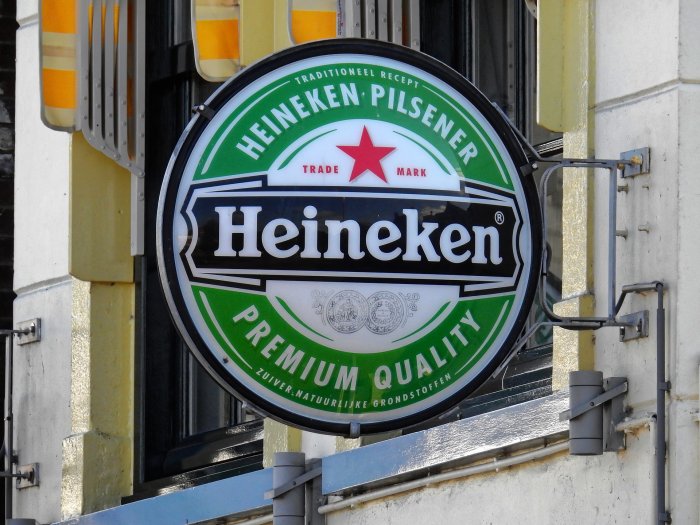Lawsuit filed against Heineken over red star

A Hungarian association and foundation have filed a lawsuit against Dutch multinational brewer Heineken at the Budapest-Capital Regional Court for using the red star in its logo, according to a press statement sent to the Budapest Business Journal today.
The Association of Former Hungarian Political Prisoners and Forced Laborers in the Soviet Union (Szorakész) and the Freedom Protecting Foundation (SZAVA) are convinced that “the red star is a banned totalitarian symbol,” for whatever reason it may be used, and “insults the memory of the victims of the communist dictatorship, and is not worthy of the Hungarian nation,” the press statement reads.
The two organizations claim that the “behavior” of Heineken of carrying a five-pointed red star as a chief element of its brand logo violates the Civil Code, which states that human dignity and related individual rights should be respected by everyone.
“Heineken’s use of the dictatorship’s symbol therefore means continuous violation of the law for members of the Hungarian nation who suffered in the totalitarian regime [of communism],” the press statement says. “Zero tolerance for the red star!” - the organizations proclaim.
Hungarian lawmakers of the governing Fidesz-KDNP coalition earlier submitted a bill to Parliament that would ban the use of what it calls “totalitarian symbols” for commercial purposes. While some reports suggested the governing party would back out from the bill, Cabinet Chief János Lázár, one of its drafters, made comments that suggested the bill is particularly aimed at Heineken. This suggestion is supported by Fidesz MP Lajos Kósa hinting later that while the stars Converse shoes and San Pellegrino mineral water use for branding are okay, the red star that Heineken beer uses is not.
The background to the controversy lies in a diplomatic row that has unfolded in recent months between Heineken and Lázár over the naming of a beer produced by a small ethnic Hungarian-owned brewery in the Transylvania region of Romania. A Romanian court banned the use of the name Csíki Sör for the local beer when Heineken brought the matter to court after it bought a competitor with a similar name, Ciuc beer. Csíki Sör was renamed Tiltott Igazi Sör (which translates as Banned Genuine Beer), though it still sports the original name in runic writing. Ever since, many Hungarian politicians, including Lázár and far-right Jobbik MPs, have called for a boycott of Heineken products in Hungary.
The website of the Heineken Collection Foundation, which details the history of the brand, notes that the red star first appeared on Heineken labels in the 1930s. “After the Second World War, in 1951, in many countries the red star - being associated with communism - changed from red to white with only a small red border. Over the years the red border of the star of all export labels gradually became more prominent, until 1991, when it became completely red again,” says the website. A quarter of a century has thus passed in Hungary when it appears no one noticed - or conspicuously cared about - the red star on the label.
SUPPORT THE BUDAPEST BUSINESS JOURNAL
Producing journalism that is worthy of the name is a costly business. For 27 years, the publishers, editors and reporters of the Budapest Business Journal have striven to bring you business news that works, information that you can trust, that is factual, accurate and presented without fear or favor.
Newspaper organizations across the globe have struggled to find a business model that allows them to continue to excel, without compromising their ability to perform. Most recently, some have experimented with the idea of involving their most important stakeholders, their readers.
We would like to offer that same opportunity to our readers. We would like to invite you to help us deliver the quality business journalism you require. Hit our Support the BBJ button and you can choose the how much and how often you send us your contributions.









